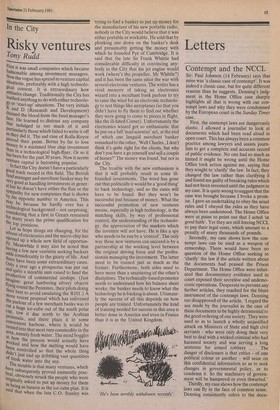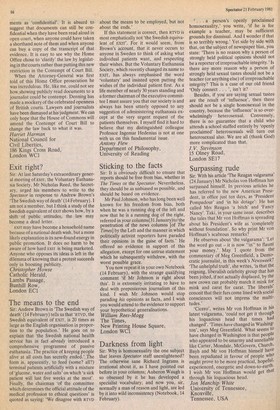Contempt and the NCCL
Sir: Paul Johnson (14 February) says that mine was 'a classic case of contempt'. It was indeed a classic case, but for quite different reasons than he suggests. Denning's judgment in the Home Office case sharply highlights all that is wrong with our contempt laws and why they were condemned by the European court in the Sunday Times case.
First, the contempt laws are dangerously elastic. I allowed a journalist to look at documents which had been read aloud in open court. This has always been a common practice among lawyers and assists journlists to get a complete and accurate record of public evidence. No one had so much as hinted it might be wrong until the Home Office took action against me, saying that they sought to 'clarify' the law. In fact, they changed the law rather than clarifying it and found me guilty of breaking rules which had not been invented until the judgment in my case. It is quite wrong to suggest that the case was brought because I broke a promise. I gave an undertaking to obey the usual rules and I obeyed the rules as they have always been understood. The Home Office were at pains to point out that I acted 'in good faith'. Yet they are still forcing NCCL to pay their legal costs, which amount to a penalty of many thousands of pounds.
Secondly, my case shows how the contempt laws can be used as a weapon of censorship. There would have been no question of the Home Office seeking to 'clarify' the law if the article written about the documents had praised the Prison Department. The Home Office were infuriated that documentary evidence used in court exposed their secretive and undemocratic operations. Desperate to prevent any further articles, they reached for the blunt instrument of the contempt laws. Denning too disapproved of the article. 'I regard the use made by the journalist in the case of these documents to be highly detrimental to the good ordering of our society. They were used so as to launch a wholly unjustified attack on Ministers of State and high civil servants — who were only doing their very best to deal with a wicked criminal who had harassed society and was serving a long sentence for armed robbery . . . The danger of disclosure is that critics — of one political colour or another — will seize on this confidential information so as to seek changes in governmental policy, or to condemn it. So the machinery of government will be hampered or even thwarted.'
Thirdly, my case shows how the contempt laws can fly in the face of common sense. Denning consistently refers to the docu ments as 'confidential'. It is absurd to suggest that documents can still be confidential when they have been read aloud in open court, when anyone could have taken a shorthand note of them and when anyone can buy a copy of the transcript of that evidence. It is easy to see why the Home Office chose to `clarify' the law by legislating in the-courts rather than putting this new restriction in the Contempt of Court Bill.
When the Attorney-General was first told of this Home Office prosecution he was incredulous. He, like me, could not see how, showing publicly read documents to a journalist could be contempt. Denning has made a mockery of the celebrated openness of British courts. Lawyers and journalists have been dismayed at his'judgment. We can only hope that the House of Commons will amend the Contempt of Court Bill to change the law back to what it was. Harriet Harman
National Council for Civil Liberties, 186 Kings Cross Road, London WC1







































 Previous page
Previous page